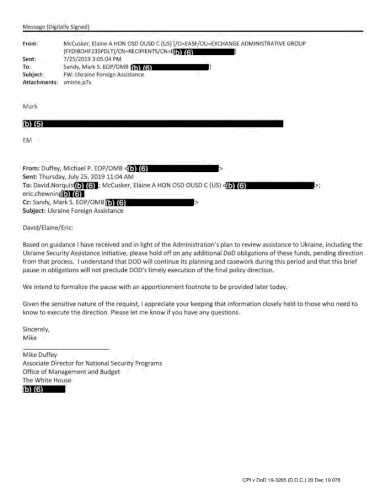Republicans involved in the impeachment inquiry have repeatedly touted the Trump administration’s sale of anti-tank missiles to Ukraine as evidence the president is supportive of the country against Russian aggression, but they’ve left out key details in the process.
Under the rules of the sale, the Javelin missiles have to be stored in western Ukraine, which is far from the frontlines of the ongoing conflict in the eastern part of the country (the Donbas region) against pro-Russia separatists.
In short, the Javelins were essentially provided to Ukraine under the condition that they not be used in the conflict zone.
Accordingly, the Javelins have yet to be used in the fighting, though US personnel are training some Ukrainian forces how to use them against tanks.
‘They’ve had symbolic and psychological impact’
Experts on Ukraine have offered mixed reviews on the impact of the US-provided anti-tank missiles, but largely seem to agree they serve as a deterrent against Russia.
Charles Kupchan, former director for European affairs on the National Security Council in the Obama administration, recently told Slate that the missiles “have not been deployed anywhere near the battlefront.”
Kupchan added: “They’ve had symbolic and psychological impact.”
Meanwhile, David Holmes, a top staffer at the US embassy in Ukraine and witness in the impeachment inquiry, told House investigators on Thursday that the Javelins provide an “important strategic deterrent.” He added that the weapons are “not actively employed in combat operations right now.”
The Javelin missiles were mentioned in a phone call at the center of the impeachment inquiry.
Javelins were mentioned in the July 25 phone call between President Donald Trump and Ukrainian President Volodymyr Zelensky that led to a whistleblower complaint and spiraled into an impeachment inquiry, and they’ve repeatedly come up in the public impeachment hearings. During the call, Trump urged Zelensky to launch investigations into his political rivals - including former Vice President Joe Biden.
At the time, Trump had placed roughly $400 million of congressionally-approved security assistance to Ukraine on hold, and the president is accused of dangling the aid over Zelensky as part of a broad scheme to pressure him into launching the investigations. The aid was ultimately released on September 11, less than a week after three House committees launched investigations into his administration’s efforts to pressure Ukraine to help his reelection camapgin.
As the impeachment inquiry has escalated, Trump has faced harsh criticism for freezing the security assistance, and allegations of risking both US and Ukrainian national security for personal gain.
But Republican lawmakers like Rep. Elise Stefanik of New York have pointed to Trump’s sale of the missiles to Ukraine to counter the narrative that Trump places his personal political agenda above national security concerns.
Republican National Committee chairwoman Ronna McDaniel tweeted a clip of one such exchange in defense of the president.
Trump, however, was reluctant to sell the missiles to Ukraine and did so only after he was persuaded it would be good for US business, current and former officials familiar with the decision told Foreign Policy.
The Trump administration first approved the sale of Javelins to Ukraine in December 2017. The sale was competed in March 2018, when the State Department announced it would sell Ukraine 210 Javelin anti-tank missiles and 37 launchers worth $47 million. The State Department approved an additional sale of the anti-tank missiles to Ukraine in October.
The Obama administration provided assistance to Ukraine as well, but would only offer non-lethal aid for fear of exacerbating the conflict and tensions with the Kremlin. There were also concerns that the anti-tank missiles could fall into the wrong hands.
The nonlethal aid provided to Ukraine under former President Barack Obama included US personnel to train Ukrainian forces, Humvees, night-vision goggles, advanced radar, patrol boats, body armor, and humanitarian assistance.
Olga Oliker, the director for Europe and Central Asia at the International Crisis Group, recently told Foreign Policy that nonlethal aid is actually considered more helpful than the Javelins, even as Ukrainian officials have celebrated their arrival.
“While generals and politicians in Kyiv played up the Javelins, in my own experience, soldiers in the field talked more about getting insufficient quantities of the nonlethal aid that they really needed - secure communications, armored vehicles, counterbattery radars,” Oliker said.
‘Even as we sit here today, the Russians are attacking Ukrainian soldiers’
Witnesses in the impeachment inquiry, including the current top diplomat to Ukraine, Bill Taylor, have underscored the importance of US assistance to Ukraine in thwarting Russia. Taylor was on the frontlines of the conflict less than a week before his public testimony to House investigators earlier this month.
In his testimony, Taylor said: “Even as we sit here today, the Russians are attacking Ukrainian soldiers in their own country and have been for the last four years. I saw this on the front line last week; the day I was there a Ukrainian soldier was killed and four were wounded.”
Taylor added: “The security assistance we provide is crucial to Ukraine’s defense and to the protection of the soldiers I met last week. It demonstrates to Ukrainians- and Russians - that we are Ukraine’s reliable strategic partner. It is clearly in our national interest to deter further Russian aggression.”
The Ukraine conflict began in 2014 and has led to roughly 13,000 deaths and displaced roughly 1.5 million people.







 Kupperman lawsuit dismissed.
Kupperman lawsuit dismissed.